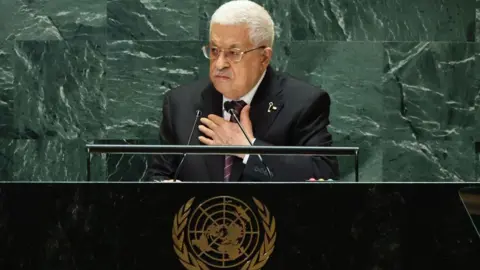Palestinian President Mahmoud Abbas has been blocked from attending the UN General Assembly session in New York next month, after he and 80 other Palestinian officials had their visas revoked, the US State Department has said.
US Secretary of State Marco Rubio blamed them for undermining peace efforts and for seeking the unilateral recognition of a conjectural Palestinian state.
The decision, welcomed by Israel, is unusual as the US is expected to facilitate travel for officials of all countries wishing to visit the UN headquarters.
The ban comes as France leads international efforts to recognise a state of Palestine at the session - a move Donald Trump's administration has opposed.
The Palestinian ambassador to the UN, Riyad Mansour, had earlier stated that, as head of its delegation, Abbas would be attending the meeting of heads of state and government.
However, a State Department official later confirmed that Abbas and about 80 other Palestinians would be affected by the decision to deny and revoke visas from members of the Palestine Liberation Organization (PLO) and the Palestinian Authority (PA).
Rubio asserted that Palestinian representatives at the UN mission in New York could attend the meetings as stipulated in the UN Headquarters Agreement.
It is unclear if the US move to deny or revoke visas complies with that document, which outlines that foreign officials' attendance in New York should not be impeded by the US, irrespective of the relations between their respective governments and the US.
Abbas' office expressed astonishment at the visa decision, which it stated stands in clear contradiction to international law and the UN Headquarters Agreement, particularly since the State of Palestine is an observer member of the United Nations. They urged the US to reverse the move.
Israel's Foreign Minister Gideon Saar welcomed the decision.
The situation in the Palestinian territories remains tense, with rival factions and ongoing geopolitical conflicts impacting governance.
In 1974, the UN voted to recognise the PLO as the sole legitimate representative of the Palestinian people and granted it observer status at the UN General Assembly, but not as a state. In 2012, the General Assembly upgraded this to recognising Palestine as a non-member permanent observer state.
Israeli Prime Minister Benjamin Netanyahu has continually rejected the notion of a two-state solution, viewing the recognition of a Palestinian state as a reward for terrorism.
The recent escalation in conflict, particularly following Gaza's military operations, has intensified debates on Palestinian statehood and international diplomacy.
UN spokesman Stephane Dujarric emphasized the importance of representation for all member states and permanent observers, especially in light of upcoming peace discussions involving pivotal stakeholders.


















